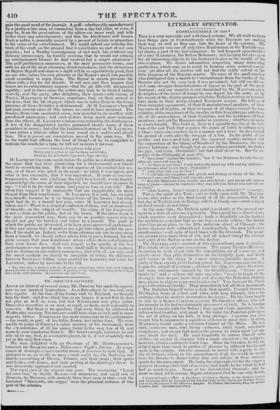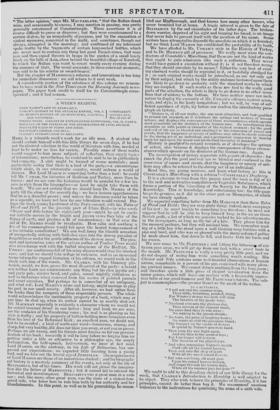CONSTANTINOPLE IN IRS.*
LITERARY SPECTATOR.
Tuts is a very agreeable and well-timed volume. We all wish to learn how things pass in Constantinople while the Russians are making their way, as well as they can, into the heart of the country. Mr. MACFARLANE was one of only three Englishmen in the Turkish capi- tal during a part of the last campaign : he had frequent opportunities of seeing MAHMOUD, the Sultan Reformer ; and:keeping his eyes open for all interesting objects, he has hastened to give us the results of his observation. We derive information respecting many interesting particulars, which may go to assist in forming some general conelii- sion; yet after all, the readers will not find the riddle solved of the little progress of the Russian armies. We were of the small number who anticipated that a march to Constantinople from the banks of the Danube was not the easy task it was presumed ; but still we did ex- pect some stronger demonstrations of vigour on the part of the great Autocrat ; and our surprise is not diminished by Mr. MACFARLANE'S description of the levies of troops he saw depart for the army, or by his report of the shabby progress which the Turkish tacticos or reeulars have made in their newly-adopted European usages. He tells us of their irregular equipments, of their ill-manufactured muskets, of their bayonets of all lengths, of their weapons of all shapes except the true scimitar, of the uneasiness of the cavalry in their long stirrups, and above all, of the unsteadiness of their discipline, and the feebleness of their members : and yet the Russians make no progress ; what they do make is dearly bought. The truth is, there is a smouldering fire at the bot- tom of the real Turk that requires the shock of battle to inflame it to a blaze: when once excited, he is a maniac and a hero: he dies behind his mound of earth after the struggle of a lion. In the midst of his gentler and low-voiced talk, and his apparent apathy, mention but the supposition of the taking of Stambool by the Muscoves, his eyes glance liehtnina-, and though but an ease-taking merchant, he dashes his pipe, and cries, Mashallah ! but that shall never be. See the an- ecdote of the Chibookji at page 272.
" Baccalum replied the inquirer, but if the Muscoves do take the city after ail, what will you do.' " As there is one God I I will stab to the heart my wife and my children— no Ghiaours shall touch them, Mashallah !'
" And what will you do then ? ' " I will take my yataghan and pistols and destroy as many of the Mus- coves as I can—and then I will run into Asia.'
" But the Muscoves have swords and pistols too : you are an old man—a man of peace—unused to warfare—they may kill you, before you can kill one of them.'
" Allah-Keirim, (God is great) I shall then die a shehhid !' " martyr). This is the spirit of a Turk; and we fully agree with Mr. MACFAR- LANE, WII0 writes as the final result of all his observation, that the last day of Turkish rule in Europe will be a bloody one—such a day as civilized annals do not know.
At the same time, the Turkish spirit is evidently at the present mo- ment in a state of extreme depression. The capital has a deserted air; whole quarters seem depopulated ; trade is dreadfully on the decline; the merchants complain that no one buys a costly article ; the Asiatic shawl has given place to the little imitat;on shawl of Glasgow the ladies dispense with embroidered handkerchiefs, the men with silver mouth-pieces ;—all signs of hard times with the Osmanli. The people are ground even more than of old, and all indeed except the courage and spirit of the Sultan seems on the decline.
Mr. MACFARLANE'S account of this extraordinary man is graphic. The details of his reforms arc curious. The young Tactico officers are beginning to strut about with the true military air of assurance and carelessness : they pride themselves on the knightly spur, and laugh and lounge in the shops in a most unmusselmardike manner. A party of these esprits forts having, joined Mr. MACFARLANE one day, bi.gan the subject of costume ; admired his whip, his glass, his watch, but were enormously amused by Ins travelling-cap. " Cease your mockery," said a serious old man opposite ; " cease to laugh at the stranger: how do you know what sort of a cap the Padishah (Sultan) may please to clap on your own heads soon ? You have got the Frank papouskes (shoes) already." They immediately left off their merriment. The Padishah himself wears a dark blue mantle, Cossack trowsers, Wellineton boots of velvet, and rides with long stirrups : this is his costume when he reviews or exercises his troops. He has been taught to ride by a Signor CALOSSO, a young Piedmontese officer, who left his country in the last revolutionary movement of 1821. He is become a prime favourite with the Sultan : they spend whole mornings in the riding-school together, and great is the value the Padishah puts upon the art of riding on his fork, in long stirrups. CALOSSO has also taught him to manmuvre a squadron of horse in good style : in short, MAHMOUD would make a tolerable Colonel of the Blues. He is a dark, handsome man, with bushy eyebrows, black beard, sun-burnt complexion, and an eye that makes the person he looks upon feel uti- easy about the neck. He used frequently to amuse himself with visiting his capital in disguise with a single attendant : his subjects, however, always contrive to know him. Since the invasion, he has in- dulged more than usual in parties of pleasure to different kiosks and spots in the vicinity. On one occasion he rowed with a party to lime isle of Princes, where, to the astonishment of all the world, he would have the Greeks to dance before him and indulge in their national sports for his amusement. He had a fire-ship exploded for the expreS3 purpose of seeing what kind of machine that might be for which he had had so much to par. Some of the discontented Osmanlis said he must be mad, while certain Rajahs whispered that he was only drank. * Constantinople in iS28. A Residence of Sixteen Months in the Turkish Capital and Provinces, with an Account of the Present State of the Naval and Military rower, and of the Resources of the Ottoman Empire. By Charles Macfarlane, Est1.4to. plates. London, 1829. Saunders and Otle y " The latter opinion," says Mr. MACFARLANE, " that the Sultan drank wine, and occasionally to excess, I may mention in passing, was pretty generally entertained at Constantinople. These assertions it is of course difficult to prove or disprove ; but they were countenanced to a certain degree, by an irregularity of purpose, and by the emanation of violent measures, conceived in the night, and sometimes, though not always, abrogated in the morning; and confirmed (if my informant spoke truth) by the fragments of certain long-necked bottles, which are never seen to contain any thing but good French wines, that were now and then espied thrown in heaps in the garden of a small lonely kiosk on the hills of Asia, close behind the beautiful village of Kanderli, to which the Sultan was wont to resort nearly every evening during the summer of 1828. The usual associate, in these convivial moments, was said to be his selictar or sword-bearer."
But the chapter of MAnmoun's reforms and innovations is too long for immediate discussion : we will return to it next week.
A considerable portion of the substance of this volume we remem- ber to have read in the New Times (now the Morning Journal) news- paper. The paper took credit to itself for its Constantinople corre- spondent; and it had reason.



















 Previous page
Previous page